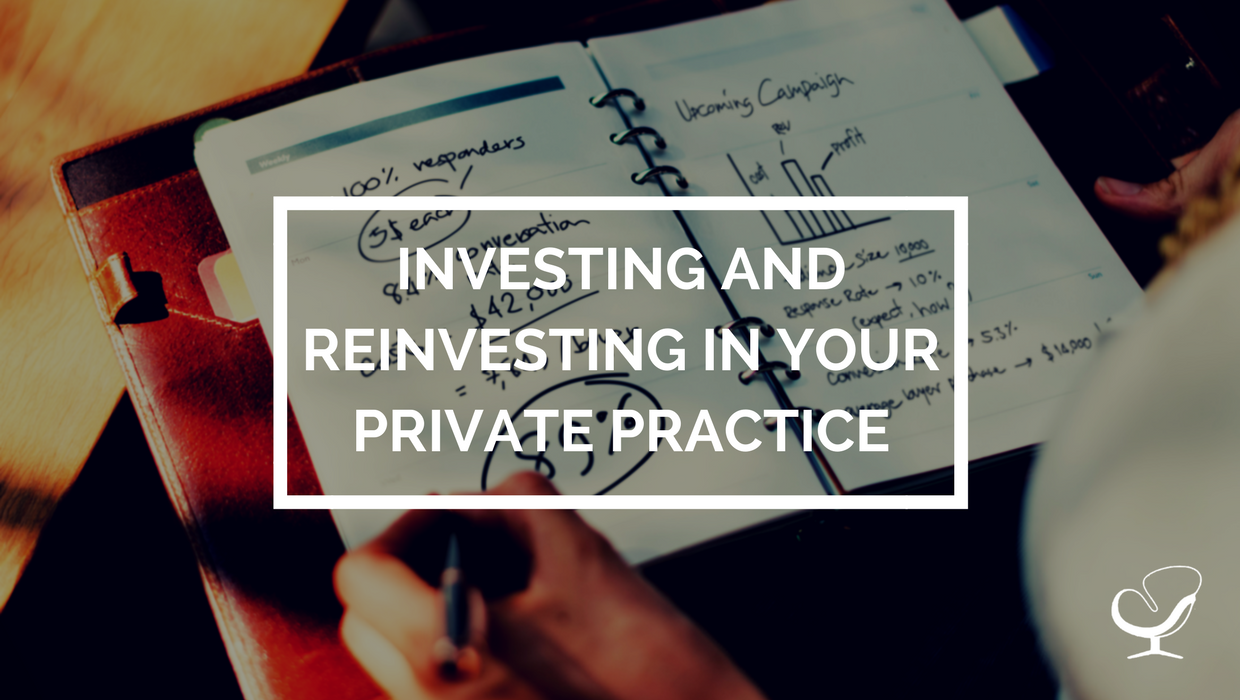You know, there is so much I have learned since I went into private practice over 10 years ago. For me, I can truly say, “I wish I knew then what I know now”! I will say though, I have experienced steady growth since I started into private practice. But, the growth could have been exponentially more had I done a few things differently.
The main thing I wish I had done differently was to invest more in my practice during those earlier days. Not only in terms of financial investment, but in terms of investing more time and effort into tracking, marketing, and investment in getting the help of others.
Get a ROI
When we think of investing, usually the first thing that comes to mind is money. The main reason people invest in anything is that they anticipate a return on that investment (ROI). It is why we invest in stocks, have a savings account, or even buy property. We know we will get that money back plus some extra (profit).
Investing also comes in terms of our time and efforts. From a business standpoint, the most important asset we have as therapists and counselors is our time. Our time and expertise is the commodity that we trade for people’s money.
What You Have Already Invested…
A way to think about all this is that you have, or are in the process of, investing in some sort of practice simply by having gotten the education and credentials to become a therapist/counselor. In fact, you have invest A LOT of time and money already. So, you absolutely should get a return on that investment, as long as you apply your knowledge, expertise, and time in the right ways. Your education was a great investment.
The problem comes with knowing how to reinvest and leverage that asset you now have in hand. This is especially true if you have chosen to go into private practice. This is where I wish I had known more back when I first went into private practice.
Your Practice Is a Business
First of all, you have to remember that private practice is a business. Like any business, it takes some investment of resources to get things started. The good news is that private practice really does not take a whole lot of capital to get started.
You basically need a place to meet with clients. You will need the infrastructure for them to be able to find you (websites and marketing plans). You need a way for you to respond to their contact with you (phones, email, etc.). Then you need a way to document and track things on both the clinical and business side of things. Other than furniture and office equipment, you do not have to invest in any sort of inventory.
What I wish I would have done differently in those beginning stages would have been to invest in all these areas a little differently.
Here’s a Short List Of Ways To Invest & Reinvest In Your Practice:
- Invest in a Psychology Today profile.
- Invest in a good website design and put the time and effort into getting your SEO (Search Engine Optimization) and ranking up. Set a goal to have website show up on the first page when people do a search for counselors and therapists in your area.
- Invest some time and effort into creating a niche for yourself. Specialize as much as you can. It will make you stand out and get you your ideal clients.
- Blog, blog, blog … This is what will help the most with SEO and establishing yourself as an expert.
- In the beginning stages, it is a good idea to “bootstrap” and do all that you can yourself. But, once you start getting clients and bringing in some income, invest in a virtual assistant. (I wish I had done this much sooner. It is well worth the investment and allows me to see more clients).
- Put some time into social media. Pick one that you like the most and invest in getting active on that platform.
- Pay yourself through saving. Make a priority of reinvesting in the practice by creating a buffer for those slow times and when you need to expand or grow the practice. (Ideally, you would want to have two to six months of expenses and salary covered.) Start doing this right away!
- Invest in more knowledge. Especially invest some time and money into learning about marketing and running a small business. Listen to podcasts, take some e-courses, attend webinars and workshops geared to private practice and/or small business development.
- Invest in consulting. One of the best ways to “fast-track” yourself is to draw on the support and expertise of an expert. It will absolutely bring a ROI.
- Invest in a good practice management system or Electronic Health Record (EHR) system. It will not only keep you organized and on track, it will save you so much time and worry down the road.
- Invest time into creating a business plan and budget for your practice. It will help you with knowing and tracking your KPI (key performance indicators).
- Invest in things that will diversify your streams of income. Things like adding other counselors to your practice and offering groups, seminars and workshops that people would bring your other income sources.
Growth Comes From Reinvesting
As you grow, always put money and time back into your practice. Of course, you need to pay yourself. The old adage of “your need money to make money” is somewhat true, especially when it comes to investing in your practice. You do need to invest in your practice for it to grow and scale up.
Finally, I think it is always helpful to think in terms of ROI. Not only the return on the money you invest, but the time you invest. And, the time investment is where I wish I had focused differently when I first started into private practice. I spent too much time doing things that burned up time I could have been spending on marketing and also seeing clients.
Spend your time and your money well on your practice. It will be well worth your investment!
 L. Gordon Brewer, Jr, MEd, LMFT
L. Gordon Brewer, Jr, MEd, LMFT
Gordon is a licensed marital and family therapist in private practice located in Kingsport, TN. He is the owner/president of his group practice Kingsport Counseling Associates, PLLC (www.kingsportcounseling.com). Gordon has been in practice for over 10 years and is also a private practice consultant. His blog and consulting website is www.practiceoftherapy.com. You can also find out more about Gordon at:
- Facebook: https://www.facebook.com/practiceoftherapy/
- Twitter: https://twitter.com/therapistlearn
- Pinterest: https://www.pinterest.com/kptcounseling/
- LinkedIn: https://www.linkedin.com/in/kingsportcounseling

